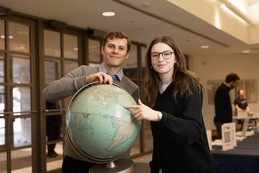Where Is Mr. Kranz When You Need Him?
Guest Opinion
By Tom Gutowski | Sept. 12, 2020
Global warming is often discussed in terms of a few degree increase in average temperature, slowly rising sea levels, and more severe weather. None of this is good, but it doesn’t seem bad enough to warrant a sense of extreme urgency. Besides, we’ve got COVID-19 and an ailing economy to deal with. Climate change and other environmental issues can wait.
Or can they? The answer depends on how much we love our children and grandchildren.
Death Valley recently registered 130 degrees Fahrenheit. Hundreds of wildfires, including some that spawned fire tornados, are ravaging California. In June of this year, a town in Siberia registered 100 F. Baghdad hit 125 F in July; in heat like that, extended exertion can cause potentially fatal hyperthermia. In August, Iowa and Illinois experienced winds of over 100 miles per hour. Clean water for drinking and irrigation is becoming more scarce.
In a 2015 press conference, NASA scientists said a sea-level rise of at least three feet is locked in, possibly by the end of this century, but certainly by the end of the next. And the melting of glaciers has accelerated since then. In 2019 the Greenland Ice Sheet lost a record 586 billion tons of ice. A recent report from the National Oceanic and Atmospheric Administration says an eight-foot sea-level rise by the end of this century is within the realm of possibility.
Whatever the actual number turns out to be, by 2100, large portions of coastal areas will be inundated, and others will be more vulnerable to storm surges. That, plus rising temperatures, will create tens of millions of refugees and massive political instability. And the melting ice will free long-frozen organisms such as anthrax, smallpox, and bubonic plague, some of which may reinfect mankind.
The oceans, without which human life would be tenuous, contain an estimated 700 hypoxic “dead zones.” The largest of these, in the Arabian Sea, was measured in 2018 at 63,000 square miles. Global warming, pollution, and runoff of sewage and agricultural chemicals are the major causes. There are also several large debris fields consisting of microplastics and larger chunks of debris floating just below the surface. One of these, the Great Pacific Garbage Patch, is approximately four times the size of California. According to a study by the Pew Charitable Trust, 11 million metric tons of plastic end up in the oceans annually, and the rate is increasing. If we keep it up, by 2050 the volume of plastic in the ocean could exceed the volume of fish.
Sixty percent of the Earth’s wildlife has disappeared since 1970. An estimated 150 species of plant and animal life go extinct every day. The population of bees — necessary for pollination — has been declining for years, as has the population of birds. At the same time, pests such as fungi, bacteria, and certain insects are moving north because winters are no longer cold enough to kill them.
You and I may be OK, but if we don’t change course soon, coming generations are screwed.
Here’s the kicker: Technology, while extremely important, isn’t the whole answer. Yes, drive a hybrid, use LED bulbs, and put solar panels on your house. It all helps. But it’s not enough.
When we make the use of a resource that’s more efficient, we tend to use more of it, not less. Take LED bulbs, for example. Thanks to LED technology, the wattage required to produce a set amount of illumination has decreased. But the total amount of energy we use to produce light has actually increased: We put more light in parking lots and on roads, we have brighter and larger signs and scoreboards, and so on.
In other words, we frequently use gains in efficiency to improve our standard of living rather than to conserve resources. The implication is that to effectively fight climate change, as well as to substantially reverse or mitigate the effects of pollution — i.e., to preserve as much of our way of life as possible — we’ll need to take collective action.
This could mean some combination of nuclear power, a carbon tax, more use of cap and trade (several states already have cap and trade programs), extending clean energy tax credits, ending fossil fuel subsidies, providing additional funding for research, reinstating requirements that fossil fuel power plants reduce emissions, eliminating single-use plastics, building more public transportation, etc. There’s no silver bullet; we need to adopt promising policies and then adjust as circumstances dictate.
We also need to build a more resilient society by providing greater access to healthcare, hardening our infrastructure, and strengthening working families so they can better withstand future downturns caused by pandemics or climate catastrophes.
Little of this is likely to happen unless it’s driven by a citizenry that believes in science, thinks promoting the general welfare is a legitimate government function, and is engaged in the political process at every level.
One may be excused for being pessimistic. There’s widespread distrust of science in America, we’re fragmented along multiple fault lines, and some folks think being told to wear a mask to protect others during a pandemic is an unbearable infringement of their liberty. The social contract is clearly frayed. But don’t get discouraged; get involved. As NASA Flight Director Gene Kranz famously said during the Apollo 13 mission, failure is not an option.
The author wishes to thank his brother, Timothy Gutowski, Professor of Mechanical Engineering at MIT, for insights regarding the relationship between efficiency and resource usage, and the consequent need to look beyond technology for solutions to global warming.
Trending

Michigan’s Marijuana Tax at Work
Cannabis has become a big business in northern Michigan, and local governments are putting tax dollars earned from dispensar… Read More >>
California Sober: Why People Are Switching from Alcohol to Weed
They call it “California sober.” Generally speaking, this term applies to folks who use marijuana but abstain f… Read More >>
The Legacy of Student Activism
“It’s a physical letter to your representative,” Alex Tank says when asked to define the word “prote… Read More >>


